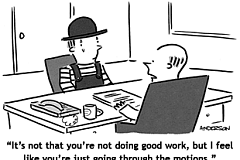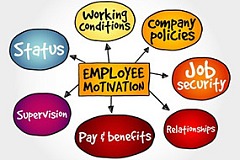 Terminating an employee is never easy, but sometimes it's necessary. There's nothing enjoyable about having to terminate an employee. It's a difficult process that many try and avoid at all costs.
Terminating an employee is never easy, but sometimes it's necessary. There's nothing enjoyable about having to terminate an employee. It's a difficult process that many try and avoid at all costs.
Between the tense atmosphere of conflict and the uncertainty of how they'll react, terminating an employee is never easy.
However, sometimes it's necessary. [quotesright]At the end of the day, a business needs to run well. [/quotesright] And no matter how difficult may be, it's often for the best. In fact, removing an employee can actually boost company morale and improve productivity.
Before you rush to any conclusions, be sure to think about all possible actions and make sure you’ve done your part to match the employee to the job you are asking them to do.
The nine Signs it’s time to let them go:
[sidebar]
“If you can’t change the person, change the person.” – Ira Calpak
[/sidebar]
1. They're untrustworthy
As a business owner, it's critical that you're able to trust your employees to get their work done on time. But some employees, no matter how much training they receive, just don't make the cut. If you still can't trust your employee to get the job done and sufficient training, it could be time for termination.
Take a breath and evaluate any problem employees. If you left them unsupervised, do you feel they could adequately perform their job? If the answer is no, then ask yourself if your employee training has prepared the average employee to be understand what they need to do.
Many training programs consist of little more than “Here’s your desk, there is the computer, now take care of xyz. You have the notes the last person used tacked to the wall.” [quotesright]A well-conceived and thought-out formal training process is essential to getting a job done right, every time. [/quotesright] If you’ve done all that and they still can’t perform, it’s time for a change.
2. They're frequently late
Let's get one thing out of the way: Sometimes being late is excusable. If there's a family emergency or roadwork, there's nothing that can be done and the employee deserves a break. With today’s two-earner families or single parents, [quotes]you are faced with a different reality than during the single-earner family days of the ’50s.[/quotes] Keep in mind you may need to rethink how your team functions at its best, it may not be the way you’re doing it. Will flex time work? Do you need everyone working from your building or can they work remotely?
However, tardiness can is an issue when an employee consistently fails to show up on time. Lateness is problematic for two key reasons.
First, when it comes to business, time is money. Every moment counts, especially if you're running a small team. A missing employee means incomplete or late work, which in turn hurts your entire team.
Second, it shows a lack of basic manners. Truthfully, it doesn't take much effort to show up on time. [quotesright]A late employee is an employee that doesn't value your time, the time of others, or the company. [/quotesright]
Take the employee aside and mention the problem. There's always a chance your employee will take the conversation to heart and change.
3. They don't show up at all
While being late is annoying and inconsiderate, it's still better than not showing up at all. If you're dealing with an insubordinate employee who doesn’t show up, it's time to talk with HR.
If your employee doesn't value the job, there are likely dozens of candidates who would be happy to have the position.
4. They're disruptive to the work environment
It's impossible to overstate how much your work environment matters. [quotes]Employees need a space to complete their work in a safe, quiet manner, as well as let off a bit of steam every now and again. [/quotes]
Some employees are just problematic from the get-go. If an employee – no matter how skilled – is disruptive to office culture, the employee needs to go.
The old adage “one bad apple spoils the bunch” is certainly true. All it takes is one disruptive employee and the entire atmosphere can be thrown off.
[sidebar]
Hire the Right Person
To Begin With
Today, with validated personal assessments, you can dramatically improve the odds of hiring the right person up front. We help companies do it all the time in sales, management and across work tasks and industries.
Factoring in the cost of lost productivity when you have to let someone go and training someone new, isn’t it smarter to just hire the perfect person to start?
We can help. Let’s talk. USA: 877.433.6225 feedback@focalpointcoaching.com
[/sidebar]
5. They simply cannot perform their job
Sometimes the problem isn't disruption, but simple execution. They may even be model employees; people get along with them and they always show up on time.
With that said, employee that cannot perform their jobs well still may need to be terminated. Whether they're turning in subpar work or no work at all, they represent you. Be it a time management issue or just a skill issue, it's always problematic.
[quotesright]Consider if you're okay with your problem employee representing your brand[/quotesright] as a whole. Their work is a reflection on yourself, your own hard work, and the brand that you've put blood, sweat, and tears into.
A termination doesn't always need to be for personal reasons: Sometimes it's just business.
6. They're unmotivated
An unmotivated employee can often be as bad as a tardy employee. An employee can be physically present without being mentally present at the same time.
When you notice a dip in an employee's work output or quality, take the employee aside for a chat. Ask if there is any reason for the lack of motivation. It's important to give an employee the benefit of the doubt at first, because [quotes]you can never be sure what's going on in the employee’s personal life.[/quotes]
If it’s a case of general lack of motivation, terminating the employee isn't out of the question. It could be best for your business and for the employee.
7. They start conflicts
While yes, it's important to give an employee the benefit of the doubt, that only extends so far. If they're starting interpersonal conflicts, termination needs to occur ASAP. [quotesright]Some people just cannot be team players. [/quotesright]
You wouldn't want to work with an outwardly hostile employee. Why would you not expect the same of your coworkers?
Terminating an employee who creates Jerry-Springfield-like workplace drama shows your employees that you care about their well-being and safety.
8. They're unable to adjust to change
Change, be it some new technology, a new office, or just a new coworker, is a part of life. It's important to deal with it in a healthy and effective manner. [quotesright] No one likes change. Often, resistance to change is based on fear: [/quotesright] Fear of not being able to handle the new work; of not understanding how it will affect their seniority or respect as the go-to expert; or wondering if will it eliminate their job?
The better job you do involving your employees in upcoming changes, why they are necessary and helping individuals with their concerns and fears often removes most of the problem. A few will never overcome these fears.
A flexible employee is one that's able to roll with the changes and make the most of their resources. Treat these employees well. They're often among the most loyal and hardworking employees you could ask for.
Terminating an employee who cannot adjust to changes – even small ones – is a hard but necessary task. Businesses change on a nearly constant basis and you need a team that understands that.
9. They have poor communication skills
There's just no overstating how critical communication skills are for an office environment. Your office is a team, after all, and they'll need to work together to get things done.
If an employee has poor communication skills, they may exhibit some of these traits:
[quotesright]Poor communication skills have no place in a team environment. [/quotesright] However, termination isn’t always the solution, improving social awareness and communication skills often resolves the problem and pays unexpected dividends.
It’s a failure to understand that not everyone thinks, prioritizes, or communicates the way they do. [quotes]It’s like one is broadcasting on AM the and the other is listening on FM [/quotes] and both can’t understand the other’s communication. It’s a huge cause of friction and problems.
Don’t believe it? How well does your sales team communicate with your engineers or the IT team? [quotesright]There are four basic communication styles that broadly describe behaviors and communication identified by one system we used called DISC.[/quotesright] Teaching people the skills to understand and recognize each of the communication styles in others is key to helping them effectively communicate. This training makes a huge difference in your team’s effectiveness and efficiency so [quotes]don’t ignore the productivity gains this can bring. [/quotes]
To learn more about how effective communication can change your productivity, contact us – we have effective and affordable training solutions for your company.
Terminating an Employee is Never Easy
Removing an employee for whatever reason is an unpleasant but sometimes necessary task. Whether it’s a question of persistent tardiness or just poor work, a bad employee is bad for the whole group. Keep this list handy, it may save your team's morale.
And, don't forget to let me know what you think! I always love hearing from you. Whether you agree or disagree, your opinion matters.














